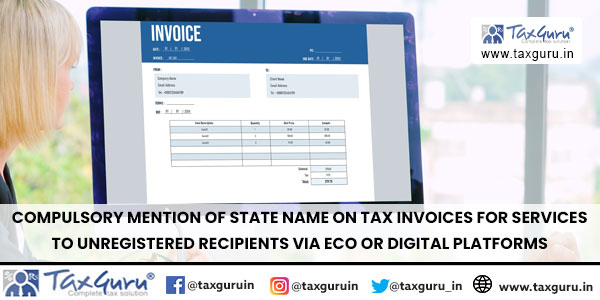Introduction:-
Central Board of Indirect Taxes and Customs (CBIC) has recently issued Circular No. 242/36/2024 dated 31.12.2024 which provides clarification on regarding place of supply of Online Services supplied by the suppliers of services to unregistered recipients along with Compulsory mentioning of State Name on Tax Invoices on supply of SERVICES to Unregistered Recipients via ECO or Digital Platforms. The same is discussed below:-
Proviso to sub-rule (f) of Rule 46 of CGST Rules :-
Rule 46 of CGST Rules deals with the contents of Tax Invoice and its sub-rule (f) has the following proviso:-
Proviso to Rule 46 (f) wef 26.12.2022:-
Provided in cases involving supply of online money gaming or in cases that where any taxable service is supplied by or through an electronic commerce operator or by a supplier of online information and database access or retrieval services to a recipient who is un-registered, irrespective of the value of such supply, a tax invoice issued by the registered person shall contain the name of the state of the recipient and the same shall be deemed to be the address on record of the recipient.

Section 12(2) of the IGST Act:-
Sub-section (2) of Section 2 The IGST Act provides that:-
The place of supply of services, except the services specified in sub-sections (3) to (14),-
(a) made to a registered person shall be the location of such person;
(b) made to any person other than a registered person shall be,-
( i ) the location of the recipient where the address on record exists; and
(ii) the location of the supplier of services in other cases.
Considering above provisions, it is clear that in case of supply of taxable services to an unregistered person through ECO or OIDAR services, the tax invoice shall contain the name of the State of the recipient irrespective of the value of supply and the same shall be deemed to be address on record and since the address of recipient is now available on record (i.e. his State name) the same state shall be considered to be place of supply for such service.
Analysis
All the services supplied to unregistered recipients over digital or electronic network, either by supplier using his own digital or electronic facility/platform or through any other digital or electronic platform owned and operated by an independent ECO- both will be covered under the proviso of Rule 46(f) of CGST Rules along with section 12(2)(b) of IGST Act and thus will require the mention of the name of the state of the recipient on the Tax invoice irrespective of the value of supply and the same shall be considered to be the place of supply of such service.
Mechanism to collect the name of state:-
For the above purpose the supplier should devise a suitable mechanism to ensure that the name of the State of the recipient is collected from the unregistered recipient before any supply is made to him via ECO or via supplier owned digital/electronic platform (like website etc.) so that the same can be mentioned on tax invoice.
Penalty on non –compliance: –
In case of failure to issue invoice in accordance with the said provisions, the supplier may be liable to pay maximum penalty u/s 122(3)(e) of CGST Act i.e. upto Rs. 25000/- in CGST and SGST each for each invoice on which state name is not mentioned.
*Summary of above*
Mentioning the name of state of the recipient on tax invoice is mandatory if below conditions are fulfilled:-
- Types of service being supplied:-
- Supply of online money gaming
- Any taxable service supplied through an independent ECO or supplier owned digital/ electronic platform
- Supply of OIDAR services
- Supply to: – An unregistered recipient.
- For invoice value:- Any value of supply
Non compliance may attract penalty of Rs. 25,000 in each Act for each invoice.
****
Disclaimer: The information provided in this write-up is for general informational purposes only. Every effort has been made to ensure the accuracy and reliability of the content; however, readers are advised to verify the information with the relevant provisions of the GST law or seek professional advice tailored to their specific circumstances. The author disclaim any liability for errors, omissions, or actions taken based on this material





